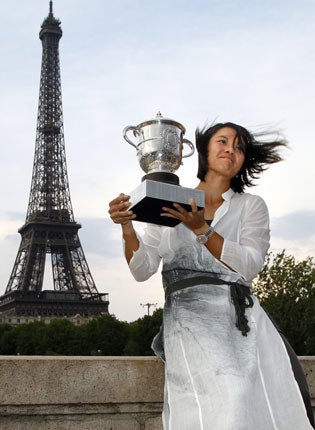Mature Li learns value of singles life with husband urging her on

In an age when rackets can be thrust into children's hands before they can barely walk it is refreshing to have a Grand Slam champion who has grown up knowing there is more to life than backhands and forehands. Li Na, who beat Francesca Schiavone 6-4, 7-6 to win the French Open, is 29 years old but still regards herself as a tennis novice.
"European or American players grow up playing tennis from a very young age," Li said as she looked back on her career just hours after her triumph here on Saturday night. "Asian players are different. At 29 I may not be young any more, but I feel young because I haven't been on the tour for that many years."
Asia's first Grand Slam champion, who grew up in the city of Wuhan in Hubei province, did not pick up a tennis racket until she was nine but made quick progress. She was sent to the John Newcombe Tennis Ranch in Texas at 15 and won her first titles on the International Tennis Federation circuit at 17. Three years later, however, Li gave up the sport. She wanted to develop her singles career, but the Chinese authorities insisted she concentrate on doubles, which they believed offered a more likely prospect of Olympic success.
At 20 Li enrolled at journalism school. "I didn't play tennis for two years," she said. "In my class, nobody knew I was a tennis player. We had a choice about which sport we wanted to play. Some chose tennis, but I said: 'No, sorry, I don't know how to play tennis'. In 2008, when I was playing in the Olympics in Beijing, some of my old class-mates saw me and said: "Wow, where did you learn to play tennis that well?'"
Li's then boyfriend, Jiang Shan, who is now her husband and hitting partner, persuaded her in 2004 that she might regret not giving the sport another try. Her wish to concentrate on singles was finally granted and within months she became the first Chinese to win a singles title on the main tour.
She has not looked back since. Given the chance to make her own career decisions after the Chinese federation relaxed their hold on players, Li climbed the world rankings and broke into the top 10 last year.
Having reached her first Grand Slam final in Melbourne in January, losing to Kim Clijsters, she played the best tennis of her life to win here. Li beat Victoria Azarenka and Maria Sharapova, two of the tournament favourites, and went on to outplay Schiavone, the defending champion, repeatedly surprising the Italian with the power and accuracy of her ground strokes.
Li, who is expected to climb to a career-high No 4 in today's updated world rankings list, is coached by the Dane Michael Mortensen. Her husband was her coach until two months ago but stepped down after Li had a terrible run of results following the Australian Open.
"I'd never had the experience of getting to a Grand Slam final before," Li said. "After Melbourne I just couldn't concentrate in training because I had so many things to do. I thought to myself: 'I don't need to do the work. I can still win'. But after the start of the season I couldn't win a match, so I started to change the team a little bit.
"It's always tough when a player's husband is her coach and you're always fighting on the court. Michael Mortensen came in. He gave me a lot of confidence. He always says: 'You should trust yourself'. You can't always win your matches, but if you lose a match you should find out why you lost it and then try to win next time.
"My husband and I talk about everything. We're not just husband and wife. We're also friends. After I lost in Stuttgart we sat down to talk about it. I said: 'We should change things'. He said: 'Yes, I agree. What do you think we should change?' I said: 'Maybe we need to find a coach'. He said: 'No problem'.
"Afterwards I felt much easier that he wasn't my coach. He did too. He can do everything for me, but sometimes I would think: 'You're my husband. Why are you shouting at me on the court?' This isn't easy to change. But now I can talk about everything to do with tennis with my coach and talk about everything to do with the rest of my life with my husband."
Li said her husband's support had been crucial in calming her on the day of the final. "I told him: 'I know I should try not to feel the pressure, but I'm still nervous'. He said: 'Listen, she's the defending champion. You're in your first Roland Garros final. What have you got to lose? Don't think too much about what it will be like after you've won or you've lost. It's just one match. Go out there and show the whole world that you can play good tennis'."
Join our commenting forum
Join thought-provoking conversations, follow other Independent readers and see their replies
Comments
Bookmark popover
Removed from bookmarks